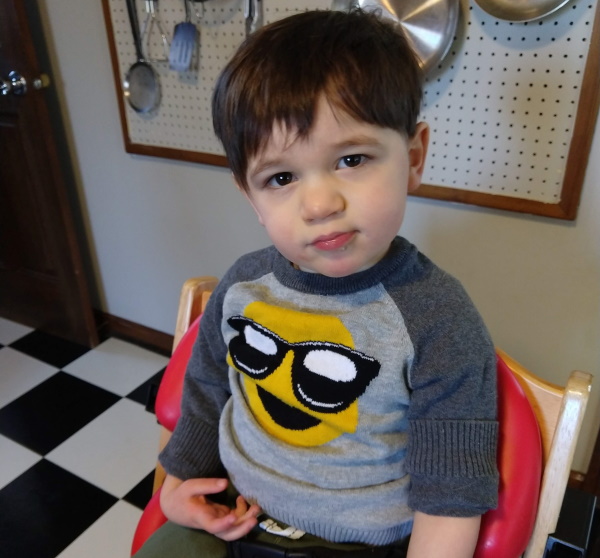
The first time I heard the term hypotonia, it didn’t even register. I focused on the shots and answered questions at that checkup when our pediatrician uttered a word I never heard before. I must have missed it. After all, humans do that. We use context clues, and if the word doesn’t seem too alarming or concerning, we tend to assume the meaning and move past it. My husband heard it, and he must have started to do research and then filed it away because we didn’t speak of it until three months later when I directly asked the doctor why our son was not sitting up unassisted at nine months old. This time, I heard the doctor.
Hypotonia – also known as – low or weak muscle tone.
Simple enough, or is it? Because our bodies have more than 600 muscles, and suddenly slow connections were being made for me about our son. Is this his issue with reflux? Is this his issue with bowel movements? Could this be the reason he doesn’t open his mouth to make a sound? Is this why he chokes on his milk? Could this be why he doesn’t have any teeth yet? Suddenly, hypotonia became a big deal in our house as we began to wonder, was it a symptom or a diagnosis?
[…] tone and strength are two different things.
Informed that hypotonia could be a stand-alone issue and possible to overcome or live within a usual way by creating strong muscles, I felt relief. Someone looked at me and even said, “I wonder if you have hypotonia,” due to how I hold my body, my movements, and I guess my overall “weak” physical demeanor. I wasn’t offended, possibly more relieved.
I understood the basics of genetics at this point, and it made sense to me that I could have a child, like myself, who wasn’t going to be winning any weight lifting competitions. There was hope he could catch up and live a perfect life.
Many diagnoses come in the form of a trickle—one word such as hypotonia, or maybe apraxia, possibly two words, global delays. The facts are that not all diagnoses are answers. Some begin the next set of questions.
Hypotonia, it turns out, is a big one for that. In some cases, it could just be something that happens, and the child can be the “clumsy” or “not very athletic” type of child. Or, with enough work, they could become strong enough to be an athlete. The basics are that tone and strength are two different things. You can have a weak tone but compensate by having strong strength.
Why do medical professionals, at times, assume we know it all?
Short version, the tone you can’t change, but the strength you can. So, if you work on creating strong muscles, it helps to “overcome” the lack of tone, which you can see some amazing athletes with a weak tone. There are incredible athletes in the Para Olympics or participating in the Special Olympics, recent ironman Chris Nikic, or your local soccer field. Chances are you wouldn’t know.
So, this is your diagnosis. You heard the word hypotonia or the words, low tone, and now you wonder what that means for your child. I can tell you it means a lot more work physically for them. It is more than I realized. At first, I only thought it was his core. Then I realized it was walking. Next, I connected to his late teething because his lack of tone made it, so he didn’t have the strength to bring things to his mouth or the power to chew for long periods. Then the gastrointestinal issues, which was when I realized, oh my goodness, there are so many muscles.
I remember being annoyed that it was never fully explained until after our genetic test results, almost age 2. Why didn’t the pediatrician tell us what this term meant and all the things it could be, and what we should look out for? Why do medical professionals, at times, assume we know it all?
I can’t tell you it’s the last diagnosis. I can’t tell you that you will ever find out the reason why. But I can tell you a few things I did learn along the way.
If you haven’t, see a neurologist. Yes, my child has a rare genetic deletion, this is not the case for all people with hypotonia, but all people with hypotonia should see a neurologist.
If your child isn’t walking but on the verge, consider getting them ankle support such as a sturdy high top or boot. If you aren’t working with a Physical Therapist (PT) this is something to consider. A great PT will help your child in the correct supports they need. Let that be just ankle support like an SMO, or a higher level orthotic such as an AFO, which my son wears. Not all PT’s are gait specialists. Consider finding one that is. It’s a question I wished I asked sooner. Which leads me to…
What is gait?
Gait is the pattern in which you move, balance, coordinate, basically your stride. So, having a specialist is essential, because at times, “fixing” the ankles can lead to the realization that the knees aren’t correctly aligned, or those hips.
Gastroenterology (GI)
Yes, some muscles control all our bowels, so it’s crucial to have a great GI doctor on your team if your child is having issues with this. It’s preferable if you notice a change to reach out sooner than later. I could write a book about GI issues and hypotonia.
Swallowing
…now this is where I would hear phrases such as, “consistent with a child of hypotonia.” That didn’t help me feel better, but it did help us get the proper chair through insurance and help the school with limitations to how they could feed and offer liquids to our son. If your child has issues with choking, requesting a swallow study is helpful.
Chewing
…my son bites, but chewing is a struggle because chewing has to do with the tongue’s movement, which, you got it, is a muscle. Learning to move the tongue can be a lot of exhausting work, and the same thing with having the energy to chew, which isn’t just up and down. Working with your therapy team, you can go over consistency and therapy options.
The tongue also equals talking. Many children with hypotonia have delayed speech. In our case, my son barely opened his mouth. Of course, he is cognitively impaired, so I won’t use him as a clear example, other than to say, if you feel it appropriate, consider an evaluation for speech as early as allowed by your local early intervention, thanks to a federally mandated program.
Early Intervention
Early intervention starts at birth. In the United States, in all 50 states, you do not need a referral for this regardless if your doctor says, “let’s wait and see you back at the next appointment.” You have the right to call at any time. You can also ask for a re-evaluation if your child didn’t qualify at that moment. They will tell you when that is if you ask. Every state has different requirements for their program, but the call is free.
My last but most crucial advice, go to a Children’s Hospital when looking for specialists if at all possible. Since they only see children, so they tend to notice things sooner. They also tend to work better as a care team, treat your child better (in our experience). I have been to children’s hospitals all over the country now, and the teamwork is always amazing to watch.
If you have any questions about hypotonia or low tone, listen to our Podcast with Cyndi Stedman, and please feel free to leave a comment or send an email.



